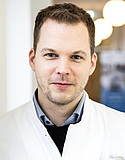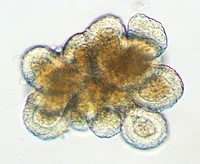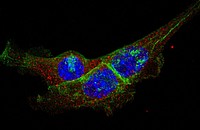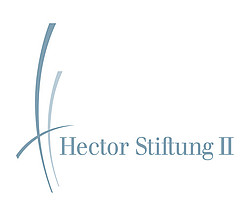Sie befinden sich hier
Inhalt
Research Focus:
In localized stages, most gastrointestinal tumors are curable by surgical resection. Once the disease has spread to distant organs, the tumors are generally considered a systemic disease and are incurable in the majority of cases.
Systemic spread is a consequence of tumor cell seeding into the blood stream. Tumor cells in circulation are called circulating tumor cells (CTC), single tumor cells found in distant organs are called disseminated tumor cells (DTC). CTC and DTC are the biological correlate of metastasis and are therefore the main reason for the high mortality of GI tumors.
We are interested in the biological traits of CTC and DTC and the mechanisms enabling these cells to perform the complex mechanism of metastasis. To investigate these mechanisms we use patient samples as well as state-of-the-art preclinical models such as genetically engineered mouse models and 3D organoid culture. In the past we were able to identify differentially regulated surface proteins in CTC which enable these cells to escape the immune system while in circulation. Future goals include the identification of druggable targets on CTC to develop agents which may be used to prevent metastatic spread of GI tumors in patients.
The NWG-KKE Translational Surgical Oncology is funded by Hector Stiftung II. Further current and former funding includes the DKTK Surgery initiative of DKTK as well as grants by Roland-Ernst-Stiftung für Gesundheitswesen and others.
We are always happy to welcome medical students and PhD students who are interested in joining our lab. Please contact us with any questions you may have.
Significant publications:
Zhu L, Kan KJ, Grün JL, Hissa B, Yang C, Gy?rffy B, Loges S, Reißfelder C, Schölch S. GAS2L1 Is a Potential Biomarker of Circulating Tumor Cells in Pancreatic Cancer. Cancers 12, 3774
Schölch S, Bogner A, Bork U, Rahbari M, Győrffy B, Schneider M, Reissfelder C, Weitz J, Rahbari NN. Serum PlGF and EGF are independent prognostic markers in non-metastatic colorectal cancer. Sci Rep 9, 10921
Steinert G*, Schölch S*, Niemietz*, Iwata N, García SA, Behrens B, Voigt A, Kloor M, Benner A, Bork U, Rahbari NN, Büchler MW, Stoecklein NH, et al. Immune Escape and Survival Mechanisms in Circulating Tumor Cells of Colorectal Cancer. Cancer Res 2014;74:1694–704
Van Noort V*, Schölch S*, Iskar M*, Zeller G, Ostertag K, Schweitzer C, Werner K, Weitz J, Koch M, Bork P. Novel Drug Candidates for the Treatment of Metastatic Colorectal Cancer through Global Inverse Gene-Expression Profiling. Cancer Res 2014;74:5690–9
Rahbari NN*, Bork U*, Schölch S*, Reissfelder C, Thorlund K, Betzler A, Kahlert C, Schneider M, Ulrich AB, Büchler MW, Weitz J, Koch M. Metastatic Spread Emerging From Liver Metastases of Colorectal Cancer: Does the Seed Leave the Soil Again? Ann Surg 2016;263:345–52
Schölch S*, Rauber C*, Tietz A, Rahbari NN, Bork U, Schmidt T, Kahlert C, Haberkorn U, Tomai MA, Lipson KE, Carretero R, Weitz J, Koch M, et al. Radiotherapy combined with TLR7/8 activation induces strong immune responses against gastrointestinal tumors. Oncotarget 2015;6:4663–76
Kontextspalte
Verantwortlich

Prof. Dr. med. Sebastian Schölch
Nachruf
Nachruf auf Prof. Dr. med. Moritz Koch





